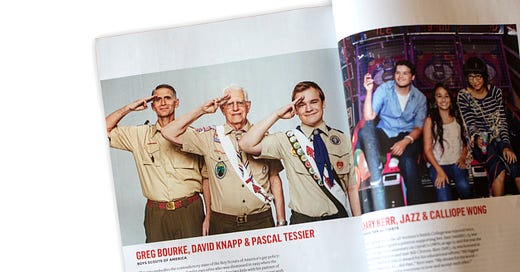Pride Profile: David Knapp
“The values of scouting are needed now more than ever in its 120-year history.”
One of the most exciting things about this newsletter, to me, is the opportunity to revisit and reintroduce some of Scouting’s most prolific activists. The people who have been fighting for a more inclusive organization for decades. There’s no one who better represents that than David Knapp, who I’ve had the pleasure of interviewing a few times over the past year.
This story was part of a collection of profiles destined for a national Scouting conference that was cancelled this year due to the pandemic. So I wanted to share it here, and give you all a chance to learn about David’s journey through Scouting, and the pivotal role he played in ending the BSA’s discrimination against gay members.
David Knapp’s Scouting career goes back eight decades, when he joined a troop in New Jersey as a child of the Great Depression.
He excelled early on, becoming an Eagle Scout and waterfront director at camp by age 17. Knapp fell into a career in professional Scouting by accident; he assumed, like I once did, that the organization was purely volunteer-run, and had no idea he could make a living in Scouting.
He ended up spending ten years working in two councils: one in New Jersey and the other in Long Island. He left his Scouting career after he married his wife and started a family, and began a new career as a sales manager.
It wasn’t until much later in his life, at age 60 — after he had rejoined Scouting as a volunteer commissioner in Connecticut — that he came out as gay to his wife. It resulted in a friendly divorce.
Then one day when Knapp was 67 years old, the vice president of his council showed up at his front door to inform him that he’d been expelled from Scouting for being gay. “I couldn’t believe what he was telling me,” Knapp recalls. How was one of the assistant Scout executives allowed to live, unmarried, with a girlfriend, but he wasn’t allowed to simply be gay?
“I was absolutely devastated and angry and upset and deeply hurt,” Knapp said.
It was right there that he decided he would fight to change the BSA’s policy. “I said, I’m going to fight the Scouts on this issue until the day I die,” Knapp said.
His anger was compounded by the fact that the BSA didn’t even have an anti-gay policy until 1978, three decades after Knapp had earned his Eagle Scout rank and been trained as a professional Scouter. Like so many others, Knapp had dedicated much of his life to Scouting without ever knowing his very identity made him ineligible for membership.
Knapp got to work right away. He picketed local councils. He organized a PFLAG chapter in his church. He marched in the New York City pride parade in a Scout uniform year after year. But nothing seemed to change.
20 years passed, and after fading from attention, the Boy Scouts gay membership issue had been thrust back into the spotlight in 2012 by a number of activists and the newly-formed group Scouts for Equality.
A year later, David Knapp found himself holed up in a hotel room with a bunch of volunteers from Scouts for Equality, not far from the BSA headquarters in Dallas. At the Scouts’ national meeting, representatives from around the country had just heard arguments on both sides of Scouting’s most controversial issue: Whether to allow gay members.
Four hours after the speeches were given and votes were tallied, the phone rang in Knapp’s hotel room. The result was in: 59% in favor of gay Scouts, 39% against. The policy passed. The whole group jumped up, yelling and screaming. Knapp and the others burst into tears.
“That’s a moment I will never forget in my life,” he said.
Do you know someone I should interview or profile? Reply to this email and let me know, and I’ll see about featuring them in a future Pride Profile.





Proud to call Dave Knapp a friend. Always happy to hear his voice, and it comes through loud and clear here. Thanks for this, Mike.